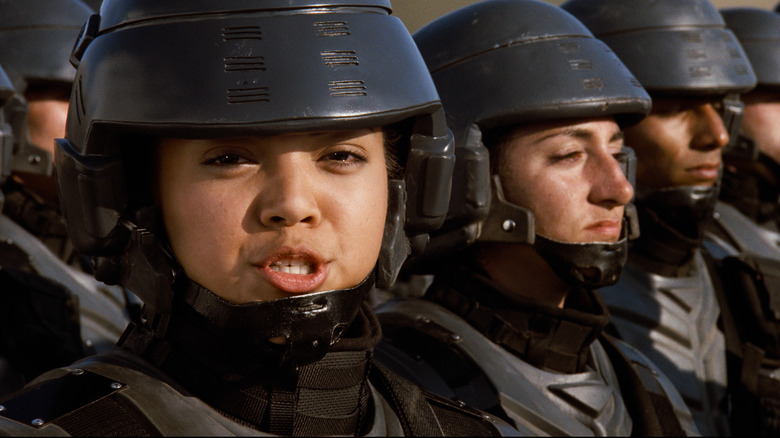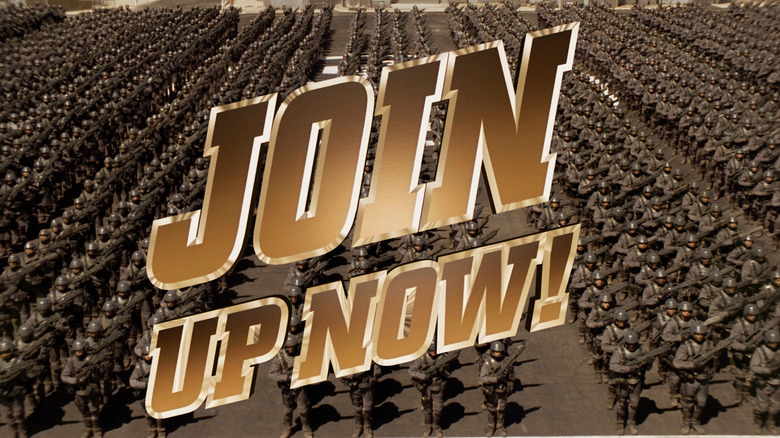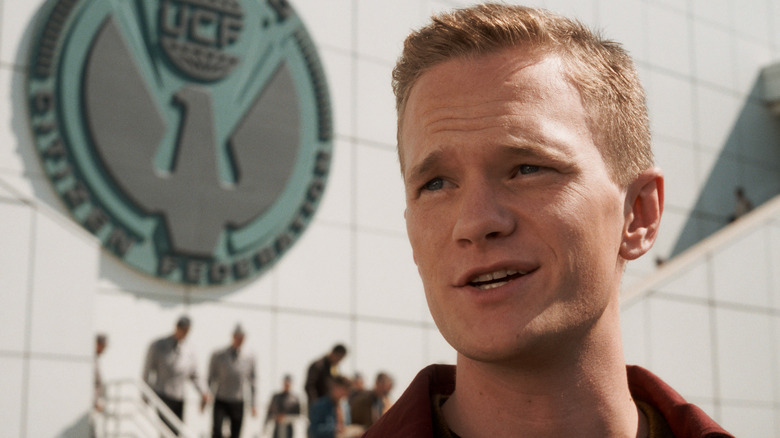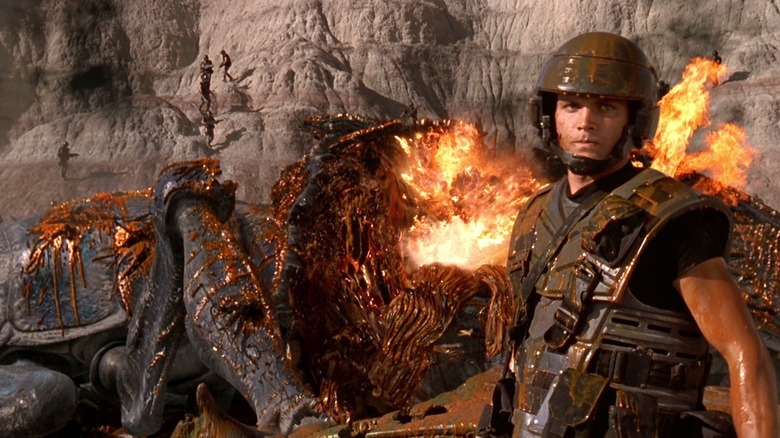
It's getting weird out there. We almost seem to be living in a post-satire era, where fact and fiction feel so interchangeable that it can be hard to tell what's news and what's a well-written joke. When The Onion starts feeling more accurate than The New York Times, it's hard to tell which end is up, and media literacy is at an all-time low. That means satire is being read completely straight, and while that's nothing new (remember "Fight Club"?), it does feel pretty scary. Then again, one of the greatest satires of all time was originally taken at face value (and still is by some viewers) — that's right, I'm talking about Paul Verhoeven's "Starship Troopers."
The 1997 sci-fi action flick was based on the very straight-faced novel of the same name by Robert Heinlein. Heinlein's novel depicts a fascist futuristic society where citizenship is inherent but something that must be earned, and non-citizens have very few rights. It's a militaristic, brutal novel that paints all of its characters as war heroes in a battle against an inhuman evil. Sure, they're fighting and killing giant alien bugs, but we never find out who started the war, exactly, and humanity has become hellbent on eradicating every alien insect in the whole universe, with other important aspects of life falling to the wayside.
There's plenty of propaganda, but "Starship Troopers" shows us a world without art, without entertainment sans purpose, where everyone is expected to "do their part" or else. Its satire is so on-the-nose at times that it feels impossible to ignore, but some audiences still watched "Starship Troopers" and wanted to know where they could sign up. Verhoeven's satire was a little too good, it seems, because so many missed the point.
Part Of A Propaganda Machine

"Starship Troopers" begins with our heroes as graduates just out of school, with Johnny Rico (Casper Van Dien) and his girlfriend Carmen (Denise Richards) checking their test scores in anticipation of military sign-ups. Carmen wants to be a pilot, while Rico is going to likely end up in the infantry due to his less-than-stellar grades. Rico's parents don't want him to sign up, knowing how likely it is that he'll be wounded or killed, but he wants to go to gain citizenship so he and Carmen can get married and have children. Things move swiftly, as Rico, Carmen, and their friend Carl Jenkins (Neil Patrick Harris) all sign up and get processed for military enrollment, and we get to see the world for what it really is. Almost all of the instructors and military personnel are missing limbs or eyes, and the officer that processes the new recruits is missing both legs and an arm! Military service is one of the only ways to get citizenship, but it comes at a very heavy cost.
The recruits don't seem to mind or notice, despite the fact that Rico's parents beg him not to join. They've been fed anti-bug, pro-military propaganda about the "failures of democracy" their entire lives and are jazzed to sign up for almost guaranteed mutilation and death. It seems impossible to believe, but it's happened throughout our own history. (In fact, there's a similar, though less rowdy scene, in the Academy Award-winning "All Quiet on the Western Front.") From its earliest moments, Paul Verhoeven's film is pointing out how ridiculous this kind of warmongering is, even if the characters are completely invested and unaware.
Taking It All At Face Value

The problem with "Starship Troopers" presenting its satire with such a straight face is that people totally missed the point. Even esteemed critic Roger Ebert didn't grasp the genius of what Paul Verhoeven was doing, mentioning that adapting Heinlein's novel faithfully was "slight satire," and giving the movie only two stars. It's strange now, because the satire feels about as subtle as a sledgehammer, but this was before everyone had the internet and access to The Onion, so maybe people just weren't used to this kind of sharp sarcasm. Then again, Verhoeven's movies have always been seriously satirical, and people have misunderstood them all. There are police officers who love "RoboCop," not understanding that it's a condemnation of police violence and militarized law enforcement, and "Starship Troopers" got taken at the same face value.
Verhoeven's intent was anti-fascist, but somehow it mostly went over people's heads. As he told The Guardian in January 2018, he modeled the uniforms and logos after Nazi regalia, and went for their distinct iconography:
"I borrowed from 'Triumph of the Will' in the parody propaganda reel that opens the film, too. I was using [Leni] Riefenstahl to point out, or so I thought, that these heroes and heroines were straight out of Nazi propaganda. No one saw it at the time."
I would say that those uniforms are too obvious to ignore, but people also didn't make the connection that the Stormtroopers in "Star Wars" are named after the original paramilitary wing of the Nazi party, the Sturmabteilung, so anything is possible.
Are You Doing Your Part?

"Starship Troopers," on a surface level, is a bombastic and ridiculously violent war film with enemies even easier to hate than Nazis, which is probably why kids and teens absolutely loved it. Too young and inexperienced to see the satire for what it was, many kids who rented the movie shortly after its release became obsessed, and "the only good bug is a dead bug!" would occasionally ring out on the school playground. It took me years to finally watch the film, convinced it was simple violence for violence's sake, and even then I wasn't sure if Paul Verhoeven was a satirical genius or not until the movie's final scene, which should make it clear for any audience that the humans are not heroes.
After a horrific battle with mass casualties on both sides, the troopers manage to catch a "brain bug," sort of the queen of the hive. Jenkins is able to read its thoughts with his psychic powers, and he yells in excitement, "It's afraid!" Everyone cheers as the pitiable creature trembles. Yes, the bugs bombed Rio de Janeiro, but it was likely in retaliation for something the humans did, and there's no real telling who started the war in the first place. The joyous "it's afraid" is the nail in the coffin for reading "Starship Troopers" at face value, the moment where Verhoeven declares that the whole thing has been deeply satirical and if you haven't figured it out, you weren't paying attention.
Verhoeven's other films have been taken similarly seriously, from "Robocop" to "Benedetta," which is a real shame because he's one of our greatest living satirists. "Starship Troopers" was clearly ahead of its time, but hopefully people can appreciate it now for its satirical genius.
Read this next: Every Paul Verhoeven Movie Ranked From Worst To Best
The post The Vicious Satire of Starship Troopers Was Too Smart For Its Own Good appeared first on /Film.
0 Comments